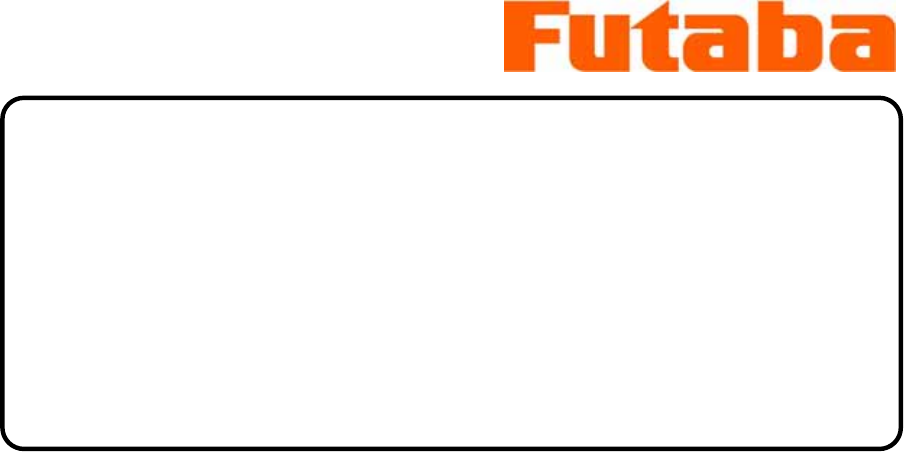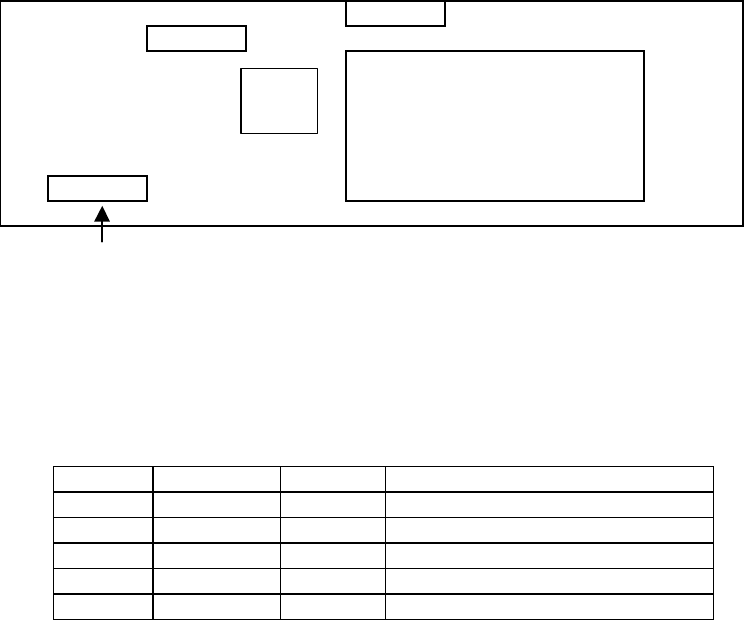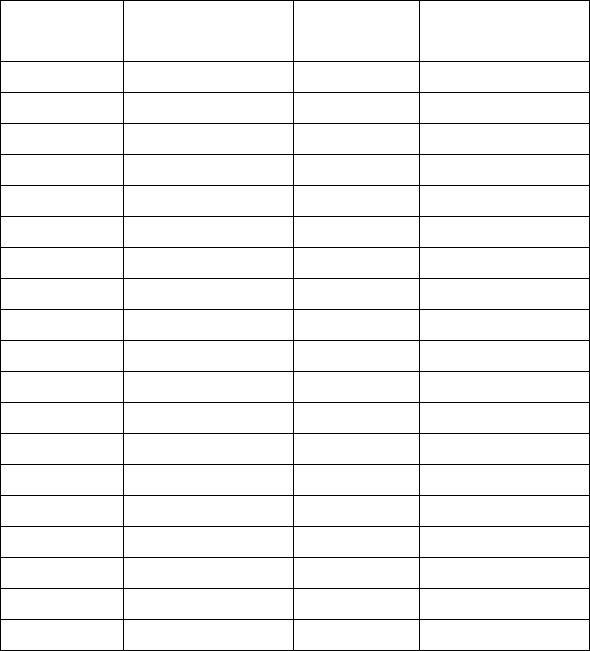Users manual

1
TMSS-2.4G/R617FS
Radio Control
Instruction Manual
INTRODUCTION
Thank you for purchasing a FutabaR digital proportional R/C system. In order for you to
make the best use of your system and to use it safely, please read this manual carefully. If
you have any difficulties while using your system, please consult the manual, our online
Frequently Asked Questions (on the web pages referenced below), your hobby dealer, or the
Futaba Service Center.
Owner’s Manual and Additional Technical Help
This manual has been carefully written to be as helpful to you, the new owner, as possible.
There are many pages of setup procedures and examples. However, it need not be your sole
resource of setup guidelines. For example, the back cover includes a quick-start set of
instructions and the Frequently Asked Questions web page referenced below includes this
type of step-by-step setup instructions for a variety of other model types.
Due to potential unforeseen changes in production procedures, the information contained in
this manual is subject to change without notice. No part of this manual may be reproduced in
any form, at any time, without prior permission.
Support and Service: It is recommended to have your Futaba equipment serviced annually
during your hobby’s “off season” to ensure safe operation.
IN NORTH AMERICA
Please feel free to contact the Futaba Service Center for assistance in operation,
use and programming. Please be sure to regularly visit the Frequently Asked
Questions web site referenced below. This page includes extensive programming,
use, set up and safety information on your radio system and is updated regularly.
Any technical updates and US manual corrections will be available on this web page.
If you do not find the answers to your questions there, please see the end of our
F.A.Q. area for information on contacting us via email for the most rapid and
convenient response.
2
Futaba Service Center
3002 N. Apollo Drive Suite 1
Champaign, IL 61822
TEL(217)398-8970, FAX(217)398-7721
HOW TO ACCESS to FAQ:
http://www.futaba-rc.com/
OUTSIDE NORTH AMERICA
Please contact your Futaba importer in your region of the world to assist you with
any questions, problems or service needs.
Please recognize that all information in this manual, and all support availability, is
based upon the systems sold in North America only. Products purchased elsewhere
may vary. Always contact your region’s support center for assistance.
The product is subject to regulations of the FCC and is restricted
under United States law to such purposes.
(See end of this manual for detail)

3
Physical Description
TMSS2-2.4G (Transmitter)
PIN ASSIGNMENT
1 2 3 4 France S203 General
OOOO
W202 PCB TB30 O LED(red)
OLED(green)
W201
OOOOO
Trainer Signal port
Trainer
port
Fig.1 Serial Communication Connector Location
Table 1 Pin Assignment(W202)
Pin Abbreviation I/O Function
1 GND in GND
2 Vcc in Vcc:9.6V
3 NC
4 Data-in In Serial data input
Serial data= 50kbps(asynchronous)
Set Frequency Pattern by S203
General : 2405.376 - 2479.104 MHz 36CH
France : 2405.376 - 2450.432 MHz 22CH

4
R617FS(Receiver)
Power requirement: 4.8V or 6.0V
Fail Safe function and Battery Fail Safe function.
Weight: 9.8g(0.34 oz)
Preparatin for operaion:
Set frequency SW 1sec PUSH for ID-match with the TMSS2 to be linked.
The LED on the receiver turns to solid green, then the R617FS is OK for use with the
TMSS2. Once the link procedure is done not need to re-link.
Frequency Allocation
The TMSS2-2.4G/R617FS can operate on 36(or22) available frequencies between
2405.376 MHz and 2479.104 MHz with 2.048 MHz separation between each frequency.
See the table below for the exact frequency assignments.
Table 2 :Frequency Channel
Channel
№ Frequency
(MHz) Channel
№ Frequency
(MHz)
02 2405.376 38 2442.240
04 2407.424 40 2444.288
06 2409.472 42 2446.336
08 2411.520 44 2448.384
10 2413.568 46 2450.432
12 2415.616 48 2452.480
14 2417.664 50 2454.528
16 2419.712 52 2456.576
18 2421.760 54 2458.624
20 2423.808 56 2460.672
22 2425.856 58 2462.720
24 2427.904 60 2464.768
26 2429.952 62 2466.816
28 2432.000 64 2468.864
30 2434.048 66 2470.912
32 2436.096 68 2472.960
34 2438.144 70 2475.008
36 2440.192 72 2477.056
74 2479.104
5
Specification
TMSS2-2.4G SPECIFICATIONS
1 Radio Characteristics
RF power output 100mW EIRP
Modulation Direct-Sequence Spread-Spectrum
Frequency band 2405.376MHz - 2479.104MHz
Channel 36/22
Antenna 1/2λ Pencil type antenna 1.6dBi
2 Radio communication control
Error checking CRC-CCITT
3 Terminal interface
Physical interface 4 pins(for data transmission port (W202)
4 Power Supplying
Supply voltage 9.6V DC
Current consumption 150 mA(Approx.)
5 Environmental
Operating temperature -10 to +60 ℃
Storage temperature -20 to +70 ℃
6 Miscellaneous
Indicator 2 color LED
Frequency setting Slide SW
R617FS SPECIFICATIONS
1 Radio Characteristics
Frequency band 2405.376MHz - 2479.104MHz
Channel 36/22
2 Radio communication control
Error checking CRC-CCITT
3 Power Requirement
Supply voltage 4.8 or 6.0V DC
Current consumption 80 mA
5 Environmental
Operating temperature -10 to +60 ℃
Storage temperature -20 to +70 ℃
6 Miscellaneous
Indicator 2 color LED
Case Plastic
Weight Aprox. 9.8g
INSTRUCTIONS MANUAL
FEDERAL COMMUNICATIONS COMMISSION
INTERFERENCE STATEMENT
This equipment has been tested and found to comply with the limits for a Class B digital
device, pursuant to Part 15 of the FCC Rules. These limits are designed to provide
reasonable protection against harmful interference in a residential installation. This
equipment generates, uses, and can radiate radio frequency energy and, if not installed
and used according to the instructions, may cause harmful interference to radio
communications. However, there is no guarantee that interference will not occur in a
particular installation. If this equipment does cause harmful interference to radio or
television reception, which it found by turning the equipment off and on, the user is
encouraged to try to correct the interference by one or more of the following measures:
-- Reorient or relocate the receiving antenna.
-- Increase the separation between the equipment and receiver.
-- Connect the equipment into an outlet other than the receiver’s
-- Consult the dealer or an experienced radio/TV technician for assistance.
CAUTION:
To assure continued FCC compliance:
(1) Any changes or modifications not expressly approved by the grantee of this device
could void the user's authority to operate the equipment.
FCC Label Compliance Statement:
This device complies with Part 15 of the FCC Rules. Operation is subject to the
following two conditions: (1) this device may not cause harmful interference, and (2)
this device must accept any interference received, including interference that may
cause undesired operation.
Exposure to Radio Frequency Radiation
To comply with FCC RF exposure compliance requirements, a separation distance of at
least 20cm must be maintained between the antenna of this device and all persons. This
device must not be co-located or operating in conjunction with any other antenna or
transmitter.